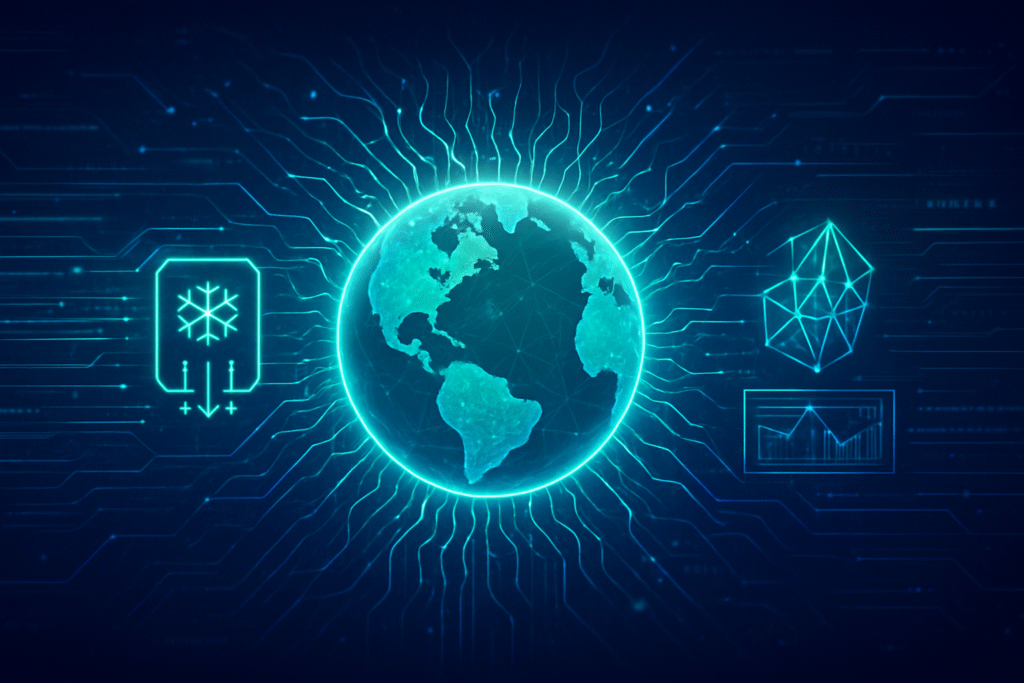
As the world gears up for the 30th United Nations Climate Change Conference (COP30), scheduled to convene in Belém, Brazil, from November 10 to 21, 2025, a critical dual focus is emerging: the urgent need for sustainable cooling solutions and the transformative potential of artificial intelligence (AI) in combating climate change. This landmark event is poised to be a pivotal moment, pushing for the implementation of concrete climate actions and highlighting how cutting-edge AI innovation can be strategically leveraged to develop and deploy environmental technologies, particularly in the realm of cooling. The discussions are expected to underscore AI's role not just as a tool for data analysis and prediction, but as an integral component in designing and scaling climate-resilient infrastructure and practices worldwide.
The upcoming COP30 is set to unveil a comprehensive agenda that places sustainable cooling at its forefront, recognizing the escalating global demand for cooling amidst rising temperatures. Key initiatives like the "Beat the Heat Implementation Drive," a collaborative effort led by Brazil's COP30 Presidency and the UN Environment Programme (UNEP)-led Cool Coalition, aim to localize and accelerate sustainable cooling measures. This drive advocates for a "Sustainable Cooling Pathway" encompassing passive design, nature-based solutions, and clean technologies, with the ambitious goal of drastically cutting emissions and safeguarding billions from extreme heat. Building on the momentum from COP28, the Global Cooling Pledge, already embraced by 72 nations, will be a central theme, with COP30 showcasing progress and further commitments to reduce cooling-related emissions by 68 percent by 2050. The anticipated launch of UNEP's Global Cooling Watch 2025 Report will provide crucial insights into country actions and new opportunities, projecting a potential tripling of cooling demand by 2050 under business-as-usual scenarios, thus underscoring the urgency of adopting innovative, sustainable cooling technologies such as natural refrigerants, high-temperature heat pumps, solar-powered refrigeration, and integrating passive cooling architecture into urban planning.
AI: The New Frontier in Climate Action and Sustainability
The role of AI in climate solutions is not merely a side note but a designated thematic focus area for COP30, signaling a growing recognition of its profound potential. The International Telecommunication Union (ITU) is spearheading an "AI for Climate Action Innovation Factory," designed to identify and scale AI-driven solutions from startups addressing critical environmental challenges like carbon reduction, sustainable agriculture, and biodiversity conservation. This initiative will be complemented by the "AI Innovation Grand Challenge," supported by the UN Climate Technology Centre, UNFCCC Technology Executive Committee, and the Korea International Cooperation Agency, which will reward exemplary uses of AI for climate action in developing countries. A significant anticipated announcement is the launch of the AI Climate Institute (AICI), a new global body aimed at empowering individuals and institutions in developing nations with the skills to harness AI for climate action, promoting the development of lightweight and low-energy AI models suitable for local contexts. These advancements represent a departure from previous, often siloed approaches to climate tech, integrating sophisticated computational power directly into environmental strategy and implementation. Initial reactions from the AI research community and industry experts are largely optimistic, viewing these initiatives as crucial steps towards operationalizing AI for tangible climate impact, though concerns about equitable access and responsible deployment remain.
The integration of AI into climate solutions at this scale presents significant implications for AI companies, tech giants, and startups alike. Companies specializing in AI-driven optimization, predictive analytics, and energy management stand to benefit immensely. Major AI labs and tech companies like Alphabet (NASDAQ: GOOGL), Microsoft (NASDAQ: MSFT), and Amazon (NASDAQ: AMZN), with their vast cloud computing infrastructures and AI research capabilities, are strategically positioned to offer the computational backbone and advanced algorithms required for these initiatives. Their existing platforms can be adapted to develop sophisticated early warning systems for climate disasters, optimize renewable energy grids, and streamline data center operations to reduce their carbon footprint. Startups focusing on niche applications, such as AI for smart building management, precision agriculture, or advanced materials for cooling, could see a surge in demand and investment. This development could disrupt existing energy management services and traditional climate modeling approaches, pushing the market towards more dynamic, AI-powered solutions. Companies that can demonstrate transparent and energy-efficient AI models will gain a competitive edge, as COP30 is expected to emphasize the "paradox" of AI's environmental cost versus its climate benefits, urging responsible development.
Broader Implications and the AI-Climate Nexus
This strong emphasis on AI at COP30 signifies a maturing understanding of how artificial intelligence fits into the broader climate landscape and global sustainability trends. It marks a shift from viewing AI primarily as a general-purpose technology to recognizing its specific, actionable role in environmental stewardship. The potential impacts are far-reaching: from enhancing climate adaptation through more accurate disaster prediction and resource management to accelerating mitigation efforts via optimized energy consumption and carbon capture technologies. However, this promising future is not without its concerns. The energy intensity of training large AI models and powering extensive data centers presents a significant environmental footprint, raising questions about the net benefit of AI solutions if their own operational emissions are not sustainably managed. COP30 aims to address this by pushing for transparency regarding the environmental impacts of AI infrastructure and promoting "green AI" practices. This moment can be compared to previous technological milestones, such as the internet's early days or the advent of renewable energy, where a nascent technology's potential was recognized as crucial for solving global challenges, yet its development path needed careful guidance.
Looking ahead, the near-term and long-term developments in AI for climate action are expected to be rapid and transformative. Experts predict a surge in specialized AI applications for climate adaptation, including hyper-local weather forecasting, AI-driven irrigation systems for drought-prone regions, and predictive maintenance for critical infrastructure vulnerable to extreme weather. In mitigation, AI will likely play an increasing role in optimizing smart grids, managing demand response, and improving the efficiency of industrial processes. The "AI for Climate Action Innovation Factory" and the "AI Innovation Grand Challenge" are expected to foster a new generation of climate tech startups, while the AI Climate Institute (AICI) will be crucial for building capacity in developing countries, ensuring equitable access to these powerful tools. Challenges that need to be addressed include data privacy, algorithmic bias, the energy consumption of AI, and the need for robust regulatory frameworks to govern AI's deployment in sensitive environmental contexts. Experts predict a growing demand for interdisciplinary talent – individuals with expertise in both AI and climate science – to bridge the gap between technological innovation and ecological imperative.
A New Chapter in Climate Action
The upcoming COP30 marks a significant turning point, cementing the critical role of both sustainable cooling and AI innovation in the global fight against climate change. The key takeaways from the anticipated discussions are clear: climate action requires immediate, scalable solutions, and AI is emerging as an indispensable tool in this endeavor. This development signifies a major step in AI history, moving beyond theoretical discussions of its potential to concrete strategies for its application in addressing humanity's most pressing environmental challenges. The focus on responsible AI development, coupled with initiatives to empower developing nations, underscores a commitment to equitable and sustainable technological progress. In the coming weeks and months leading up to COP30, watch for further announcements from participating nations, tech companies, and research institutions detailing their commitments and innovations in sustainable cooling and AI-driven climate solutions. This conference is poised to lay the groundwork for a new era where technology and environmental stewardship are inextricably linked, driving us towards a more resilient and sustainable future.
This content is intended for informational purposes only and represents analysis of current AI developments.
TokenRing AI delivers enterprise-grade solutions for multi-agent AI workflow orchestration, AI-powered development tools, and seamless remote collaboration platforms.
For more information, visit https://www.tokenring.ai/.





